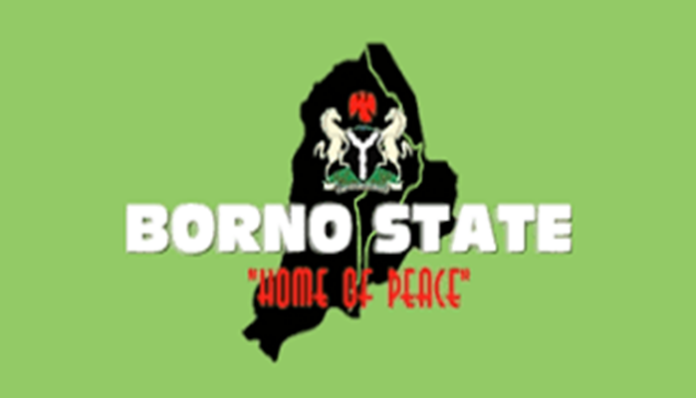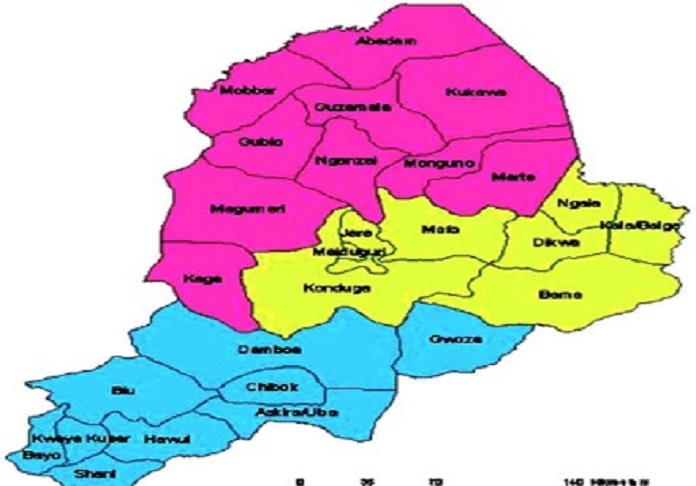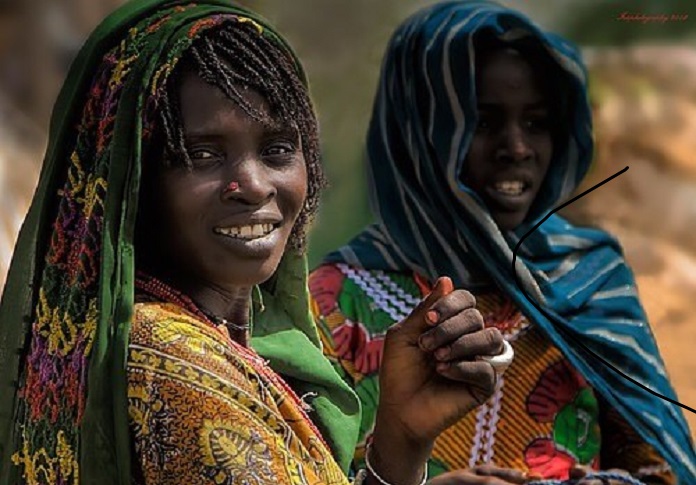There are 27 local governments in Borno state, they are: Abadam, Askira-Uba, Bama, Bayo, Biu, Chibok, Damboa, Dikwa, Gubio Guzamala Gwoza Hawul, Jere, Kaga, Kala/Balge, Kondunga, Kukawa, Kwaya, Kusar, Mafa, Magumeri, Maiduguri, Marte, Mobbar, Monguno, Ngala, Nganzai, Shani.
Borno State is a state in north-eastern Nigeria and its capital is Maiduguri. Nicknamed “Home of Peace”, Borno state is largely an agrarian state and a major source of freshwater fish in the country as it houses part of Lake Chad. The state also produces major crops such as Millet, Sorghum, Maize, Cowpea, Rice, Wheat, Cassava, Cocoyam, Gum Arabic, Livestock, Tamarind, Mangoes, Oranges, Tomatoes, Onions, Cabbage, Lettuce, Spinach and Groundnut.
Thanks to its vast land, Brno state has the highest local government in the Northeastern zone and despite its diverse differences in terms of history, religion, culture and languages amongst others, these local governments are known to be peaceful and hospitable nature. Here are interesting facts about Borno state and its local governments.
How Many Local Governments Are in Borno State?
Brno state was created on 3rd February 1976, and it has twenty-seven local governments and with Maiduguri as its state capital, main industrial centre, and by far its largest city. 16 out of the 27 local governments in Borno states were created during the Borno Emirate or Borno Sultanate – a traditional Nigerian state that was formed at the start of the 20th century. These local governments are Abadam, Chibok, Gubio, Guzamala, Jere, Kaga · Konduga, Kukawa, Mafa, Magumeri, Maiduguri, Marte, Mobbar, Monguno, Nganza.
Each f the local governments in Borno state serves as a constituency for the state House of Assembly irrespective of their population size. Some, however, have been merged to form federal constituencies for the National Assembly. Thanks to its large lands, most of the local governments in Nigeria share international borders to the North with Niger and Chad as well as with Cameroon to the East.
Its Southern and Western borders are shared with Adamawa, Gombe and Yobe States. Places like Abadam and Chibok shares boundaries with Lake Chad. Abadam in particular, borders Chad and Niger, and it’s very close to Cameroon.
Local Governments in Borno State and their Head Quarters
Borno state has 27 local governments. Each of these local government areas has its separate administrative headquarters from where governance is carried out.
Below is a comprehensive list of all the local governments in Borno State along with their headquarters:
- Abadam – Malam Fatori
- Askira/Uba – Uba
- Bama – Bama
- Bayo – Bayo
- Biu – Biu
- Chibok – Chibok
- Damboa – Damboa
- Dikwa – Dikwa
- Gubio – Gubio
- Guzamala – Gajiram
- Gwoza – Goza
- Hawul – Azare
- Jere – Jare
- Kaga – Benisheik
- Kala/Balge – Rann
- Konduga – Konduga
- Kukawa – Baga
- Kwaya Kusar – Kwaya Kusar
- Mafa – Mafa
- Magumeri, – Magumeri
- Maiduguri, – Maiduguri
- Marte – Marte
- Mobbar – Damasak
- Monguno – Monguno
- Ngala – Gamboru Ngala
- Nganzai – Gajiganna
- Shani – Shani
Which Is the Biggest Local Government in Borno State?
Maiduguri is the largest local government in Borno state. Founded in 1907 as a military outpost by the British Empire during the colonial period, the city of Maiduguri is also the state’s capital and the largest city in northeast Nigeria. As of 2022, the city is said to have a population of approximately two million. Apparently, the city grew in size by 15.1 km2 (5.8 square meter) between 2002 and 2012.
Also called Yerwa or Yerwa-Maiduguri, Maiduguri is one of the sixteen Local Government Areas (LGAs) that constitute the Borno Emirate, the city was once known as a “hub of Islamic scholarship in West Africa. It was also said that the majority of the Maiduguri population consists of Muslim Kanuri and Shuwa peoples with an admixture of Christian Nigerians from the south.
Aside from being the largest in land mass and population, Maiduguri is also the principal trading hub for north-eastern Nigeria. Its economy is largely based on services and trade with a small share of manufacturing. Maiduguri is home to three markets which include a modern “Monday market”.
Who was the First Governor of Borno State?
Group Captain Mustapha A. Amin was the first governor of Borno State. His service as Borno state governor was from March 1976 to July 1978, after the Northeastern region was divided into Bauchi, Borno, and Gongola states, during the military regime of General Olusegun Obasanjo.
Mustapha Amin started his military career as a Pilot in the Nigerian Air Force. He quickly rose through the ranks and was a Group Captain in the Nigerian Airforce when he was appointed when appointed governor by the then supreme military council of Nigeria.
As the first governor of the newly-created state, Amin made several key decisions that had huge impacts on the growth of Borno state. One of his most remarkable attempts was to stop desert encroachments by imposing restrictions on tree-cutting permits and making it an offence to set fires to clear the land. He called for the establishment of an inland port to serve Lake Chad.
Amin’s tenure as governor of Borno State ended abruptly after two years when the new Nigerian constitution was published and the ban on political activities was lifted. Mohammed Goni took over as the next governor of the state in 1979, after a brief military intervention.
Goni was Governor of Borno State, from 1979 to 1983, under the Nigerian Second Republic. He was a civil servant who resigned from the National Supply Company and joined politics. He was then elected as the first civilian governor of Borno State, on the platform of the Great Nigeria Peoples Party (GNPP). Unfortunately, he lost his second term election. He also contested for governor of the state in 2011 under the Peoples Democratic Party, PDP, but lost the election.
List of Tribes in Borno State
Aside from being home to major cash crops in Nigeria, Borno state is largely dominated by eight tribes with about 28 languages spoken by its indigenes. However, the Kanuri, Babur, Marghi and Shuwa Arab could be listed as the top three tribes you will find in the state.
The Babur and Bura people can be traced to the migrants from Yemen through Sudan and the Chad Basin to the present Babur Bura location in the Northeastern part of Nigeria. The Shuwa Arabs, on the other hand, are of Arab descent and speak a dialect of the Arabic language. They are mostly-nomadic cattle herders found in parts of the Lake Chad region ravaged by the ongoing Boko Haram insurgency. The Yerwa Kanuri are a Kanuri subgroup alongside manga Kanuri that live in Nigeria, Cameroon, Chad, Niger and Sudan. They speak Central Kanuri.
List of Tribes in Borno State are:
- Marghi Central
- Putai
- Bura-Pabir
- Dera
- Kibaku
- Ga’anda
- Shuwa Arabs
- Jara
- Babur
- Mulgwai
- Kanuri
- Marghi South
- Yerwa Kanuri
- Wandala or Mandwara
- Shuwa Arabic
- Cineni
- Dghwede
- Glavda
- Guduf-Gava
- Gvoko
- Hide
- Lamang
- Maffa
- Sukur
- Hwana
- Afade
- Waja
- Wandala


